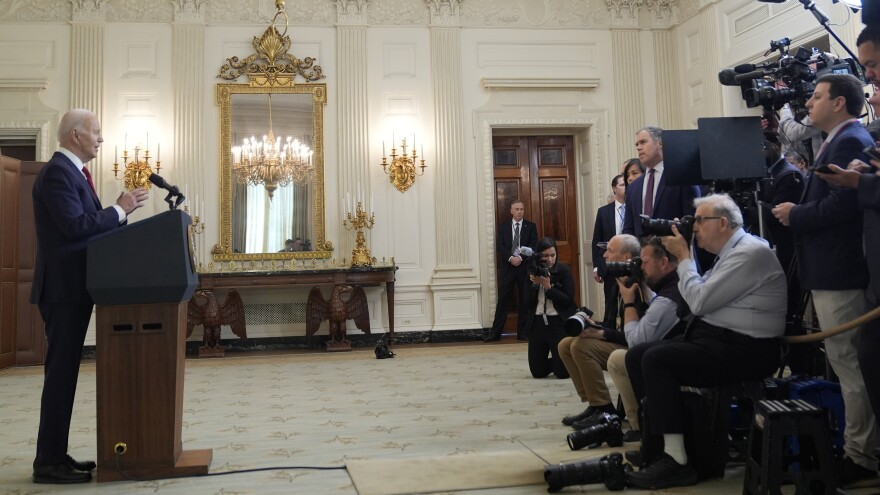Overcoming months of opposition by Republicans in Congress, President Biden on Wednesday signed a military aid package worth $95 billion that will arm Ukraine, Israel and Taiwan.
"When our allies are stronger, we are stronger," Biden said in remarks at the White House.
Referring to Ukraine, he added, "I'm making sure the shipments start right away — in the next few hours, literally, a few hours," Biden said.
The president also reiterated his strong backing for Israel.
"My commitment to Israel, I want to make clear again, is ironclad," the president said. He cited Iran's recent air attack on Israel, which involved more than 300 drones and missiles, though almost all were shot down and Israel suffered only minimal damage.
Biden has faced heavy criticism from many on the left for supporting additional military assistance to Israel as it wages a war against Hamas in Gaza. The Palestinian death toll is more than 34,000, most of them civilians, according to Gaza health officials.
Biden noted that the bill includes $9 billion for humanitarian assistance worldwide, including $1 billion for Gaza.
"We're going to immediately secure that aid and surge it," Biden said. "Israel must make sure all this aid reaches the Palestinians in Gaza — without delay."
Bulk of the money is for Ukraine
Hard-line Republicans in the House had been blocking the measure since it was proposed by Biden last fall. But the House approved the measure overwhelmingly on Saturday, followed by a similarly lopsided vote in the Senate on Tuesday.
The assistance for Ukraine, totaling $60.8 billion, accounts for nearly two-thirds of the total. This is considered urgent in Ukraine's effort to push back, or at least hold the line, against Russian forces that have had the upper hand in recent months.
The Pentagon immediately announced more than 20 different types of weapons and military equipment that will be sent to Ukraine in an initial tranche valued at around $1 billion.
The list includes two types of weapons Ukraine says it urgently needs.
One is artillery shells. The ground war in eastern Ukraine is largely an artillery war, and Russia has a huge advantage.
Ukrainian military officers have spoken about Russian artillery rounds outnumbering Ukrainian fire by up to 10-to-1. They say Ukrainian forces have had to ration shells, and in some cases, ran out of ammunition and had to retreat. As a result, Russia has been on the offensive in recent months, though its battlefield gains have been minimal.
The second key weapon is air defense missiles. Ukraine's limited air defenses have performed extremely well over the past two years, according to military analysts, but the country has been vulnerable to attacks on cities and the power grid recently.
Ukraine's President Volodymyr Zelenskyy said Russia recently fired 11 missiles in a sustained attack on a civilian power plant outside the capital Kyiv.
The Ukrainians shot down the first seven incoming missiles, he said, but then ran out of weapons. The final four Russian missiles hit the plant and caused power outages.
In another development, National Security Advisor Jake Sullivan said the U.S. recently began secret shipments to Ukraine of a longer-range missile, known as ATACMS, and that there are plans to send more.
Another U.S. official said Ukraine has fired these missiles twice in the past week in strikes against Russian targets in southern Ukraine.
Ukraine has long been requesting these weapons, which can travel close to 200 miles. The Biden administration had been resisting, reluctant to provide U.S. weapons that could hit well inside Russian territory.
Britain has sent a similar missile, the Storm Shadow, which has been credited with hitting Russian bases in southern Ukraine and ships in the Black Sea, far beyond the front-lines.
John Herbst, a former U.S. ambassador to Ukraine, says the military package is significant for reasons that go well beyond the weapons themselves.
"You've had this extraordinary spectacle over the last several months of leaders coming from Europe and recently from Japan and other places, pleading with the United States to act as the leader of the free world," said Herbst, who's now at the Atlantic Council. He called it "unprecedented since the end of World War Two. Not a good look for the United States. If we give Ukraine simply the aid we've given over the past two years, there's no way in the world [Russian leader Vladimir] Putin could win this war."
Ukraine expected to target Crimea and the Black Sea
Military analysts are not predicting major changes on the frontlines in eastern Ukraine. Despite ongoing fighting, both sides are dug in and the lines have moved little in the past 18 months.
Ukraine's main goal will likely be to stabilize conditions in this region.
The weapons being supplied by the U.S., and also by European countries, could improve Ukraine's prospects in the south, particularly the Crimean Peninsula and the Black Sea, according to Herbst.
"Putin has a real vulnerability in Crimea and southern Ukraine," he said. "He needs to keep his troops supplied there. Ukraine can make that supply route much less efficient and thereby hinder Russian military operations."
Ukraine launched a major offensive in eastern and southern Ukraine last summer to much fanfare, but managed only modest gains, far short of expectations.
Herbst said the inflow of U.S. weapons now is not likely to determine the outcome of the war. He sees no realistic prospect of a resolution — on the battlefield or through negotiations — in the near term.
But he said the U.S. support sends a strong signal and will give Ukraine the resources to keep fighting this year and beyond.
Copyright 2024 NPR. To see more, visit https://www.npr.org.




